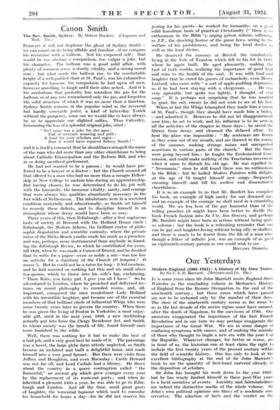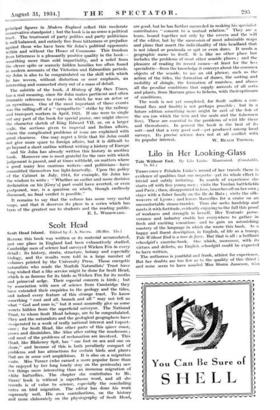Our Yesterdays
Modern England (1885-1932) : A History of My Own Times. By Sir J. A. R. Marriott. (Methuen and Co. 1138.)
IT is some years since Sir John-Marriott wrote England Since Waterloo- as the concluding volume in Methuen's History of England from the Roman Occupation to the end of the nineteenth century ; but those years which have passed are not to be reckoned only by the number of their days. The close of the nineteenth century seems as far away to us as the last decade of the an den regime must have seemed. after the death of Napoleon, to the survivors of 1789. Our ancestors exaggerated the importance of the first French Revolution and in our turn we may perhaps exaggerate the importance of the Great War. We are in some danger of confusing symptoms with causes, and of making the mistake of those who thought to begin a new era with the year 1 of the Republic. Whatever changes, for better or worse, are in front of us, the historian can at least claim the right to include the first twenty years of the present century within the field of scientific history. One has only to look at the excellent bibliography at the end of Sir John Marriott's book to see the quantity of first-hand material already at the disposition of scholars.
Sir John has brought his work down to the year 1933; but he has wisely limited himself in these post-War years to a lucid narrative of events. Lucidity and fairmindedness are indeed the distinctive marks of the whole volume. Sir John's own political opinions are those of a moderate con- servative. The selection of facts and the verdict on the principal figures in Modern England reflect this moderate conservative standpoint ; but the book is in no sense a political tract. The treatment of party politics and party politicians is well balanced, and entirely free from bitterness or prejudice against those who have been Sir John's political opponents within and without the House of Commons. This freedom from bitterness is a pleasantly positive quality in the book—. something more than cold impartiality, and a relief from the clever spite or scarcely hidden homilies too often found in modern accounts of the Victorian and Edwardian periods. Sir John is also to be congratulated on the skill with which he has woven, without distortion or over emphasis, an interesting and connected story out of a mass of detail.
The subtitle of the book, A History of My Own Times, has a real meaning, since Sir John makes pertinent and often dramatic references to events in which he was an actor or an eyewitness. One of the most important of these events was the calling-off of a " sympathetic " strike by the railway and transport workers in April, 1921. If one were to single out any part of the book for special praise, one might choose the character sketch of King Edward VII, or, on a larger scale, the sections given to imperial and Indian affairs, where the complicated problems at issue are explained with great clearness. One may regret a little that Sir John could not give more space to foreign affairs, but it is difficult to go beyond a short outline without writing a history of Europe --and Sir John has already written this history in another book. Moreover one is most grateful for the care with which judgement is passed, and at tunes withheld, on matters where a good many less cautious writers—and politicians—have committed themselves too light-heartedly. Upon the policy of the Cabinet in July, 1914, for example, Sir John has I he wisdom to write : " Whether an earlier and more decisive declaration on his [Grey's] part could have averted, or even postponed, war, is a question on which, though endlessly discussed, no final verdict is possible."
It remains to say that the volume has some very useful maps, and that it deserves its place in a series which has been of the greatest use to students and the reading public. E. L. WOODWARD.







































 Previous page
Previous page